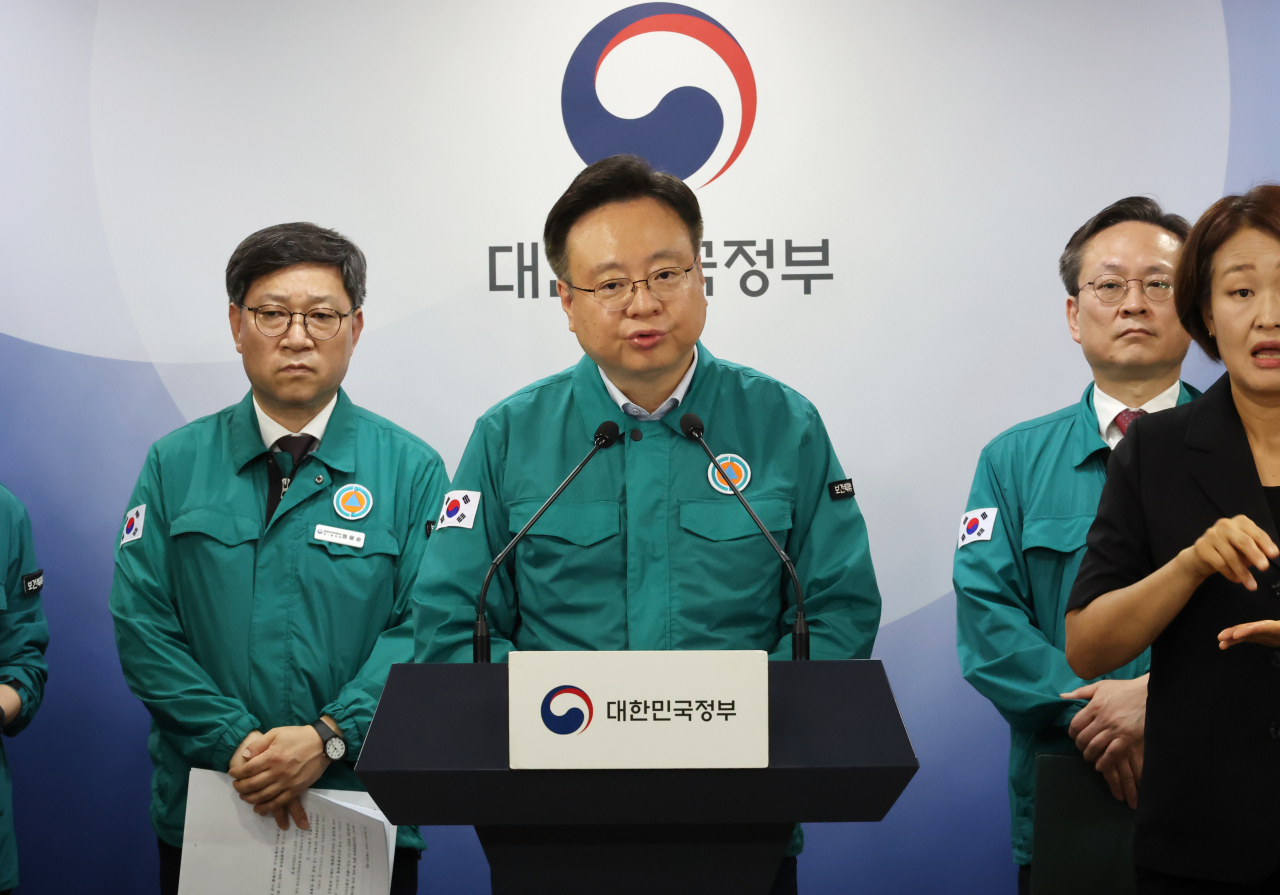 |
Health Minister Cho Kyoo-hong briefs the press at the Seoul Government Complex in Jongno-gu, central Seoul, Monday. (Yonhap) |
Five months after protesting junior doctors tendered their resignations en masse despite stern legal warnings from the government, the Health Ministry said Monday it would scrap all administrative actions imposed on intern and resident doctors, in a move seen as an effort to convince protesting doctors to resume their training and end disruptions to the nation's medical service.
Describing the appeasement step as a "last resort" for the government to address the medical standoff and ongoing disruptions faced by patients, Health Minister Cho Kyoo-hong announced that the government would also provide special considerations for those reapplying to training programs in September. Specifically, their five-month absence will not count against their recruitment and they can apply for the same specialty training they previously did at another hospital in September.
"The government made a bold decision knowing that it would face backlash (from the public) for being too lenient to junior doctors. ... But the decision aims to minimize the void in medical services for the seriously ill and emergency patients, as well as to nurture professional doctors at a proper time," Cho told reporters during Monday's briefing.
Earlier, the government had ordered training hospitals not to accept junior doctors' collective resignations, which prevented them from pursuing other jobs. However, officials reversed the plan in June to normalize hospital operations and induce those who left as they sought a breakthrough.
This was the second time the government has pulled out from taking administrative measures, according to Kim Kook-il, head of the Health Ministry's emergency response team. In 2020, the ministry filed complaints against protesting junior doctors opposing the quota hike but retracted its decision in 90 minutes.
Cho noted that the government will give "special favors" to returning junior doctors regarding their training and to those who plan to apply for intern or resident training courses slated for September. He declined to provide further information.
According to the ministry, only 1,092 out of 13,756 junior doctors at 211 training hospitals had returned as of Friday. The ministry said it was uncertain how many would return following the withdrawal decision.
Cho also requested that training hospitals finalize the number of vacancies by next Monday to prepare to recruit new interns and resident doctors who will begin training in September starting July 22.
The September recruitment was previously limited to essential medical fields such as internal medicine, obstetrics and gynecology, pediatrics and surgery, but this year's staffing will likely be open to all training courses, according to observers.
Officials hope the warm gesture will iron out the deadlock with doctors who have repeatedly demanded the government withdraw from imposing punishments and staged collective strikes in support of junior doctors who have walked out of their jobs since mid-February to protest the expansion plan. They also anticipate that it will help facilitate talks with the medical sector.
The ministry noted that the room for projecting the supply and demand for the appropriate medical personnel needed "is open" for the 2026 academic year, urging their immediate return to hospitals.
"Please do not hesitate (in returning) and have the courage to make such a decision," Cho pleaded, referring to junior doctors as "key players of the country's future health care."
In addition, the government vowed to create physician-centered hospitals to reduce dependence on junior doctors and increase the number and roles of professional doctors and physical assistance nurses, adhering to junior doctors calls for better working conditions.
Under the plan, large hospitals will be able to better focus on providing treatment to patients in need and those grappling with critical cases and rare diseases, the ministry explained.
"The government will establish a sustainable health care system where hospitals can operate smoothly without relying on junior doctors to work excessively," Cho said.



![[Herald Interview] 'Trump will use tariffs as first line of defense for American manufacturing'](http://res.heraldm.com/phpwas/restmb_idxmake.php?idx=644&simg=/content/image/2024/11/26/20241126050017_0.jpg)

![[Health and care] Getting cancer young: Why cancer isn’t just an older person’s battle](http://res.heraldm.com/phpwas/restmb_idxmake.php?idx=644&simg=/content/image/2024/11/26/20241126050043_0.jpg)

